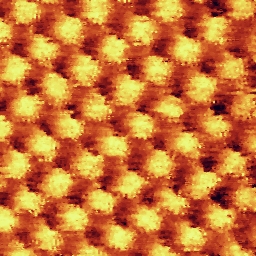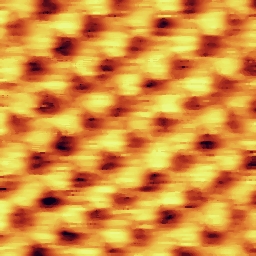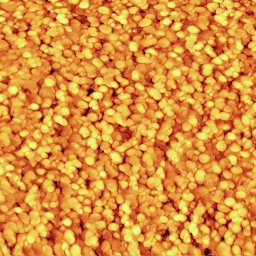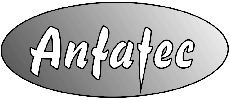Parameter survey
| Maximum Z-range: |
2 µm |
| Maximum X- and Y-Range |
>> 600 nm |
| Noise in Z-direction |
< 0.05 nm |
| Noise in X-direction |
< 0.1 nm |
| Current noise |
< 20 pA
|
| Z-noise (approached) |
< 200 pm |
| Lateral / vertical resolution: |
atomic
|
| Sample holder diameter |
12 mm |
Golden (chemically resistive) vibration isolated
STM body with implemented preamplifier
Computer with PCI board based SPM controller
Anfatec Scan & Anfatec Present
19“ STM controller (extra low noise 24 bit converters)
HV display for z-direction
high voltage amplifiers for the x-y-tube scanning
optional: PC controlled bi-potentiostat
and electrochemical cell
HOPG

current image

topographic image
Imaging Modes
Constant Height Mode
Constant Current Mode
Distance Spectroscopy
Tunneling Voltage Spectroscopy
dI/dU spectroscopy
Special features
Integrated Lockin Amplifier for dI/dV Measurements
Tip Conditioning (Bias, z)
Vertical Manipulation Surface
Spectroscopy Data saved with Images
Scripting and Horizontal Manipulation
dI/dU spectroscopy
Image of a gold surface

Sputtered Gold Layer
on Silicon
Image Range: 200 nm
Height: 2.3 nm
Further experiments, e.g. for the detection of work function differences, can be added easily,
if an additional lockin amplifier is utilized.
The STM is provided complete with image acquisition and image processing software.
As accessory, we provide a tip
etching tool for tungsten tips
based on a scientific publication.
The tool is affordable, easy to handle and guaranties over 50 % usable
STM tips.
Mechanics & Accessories
The STM is provided with an 19” Anfatec-type SPM
controller. It includes the 150 V amplification for 6 µm scan
range.
STM tungsten tip etching Tool
The tip etching tool is provided with a detailed description and a
students practical training advice.
It is
based on the droplet technique, which was first published in 1999. In
combination with a power supply with current limitation one can
reach STM tip diameters below 10 nm with over 50 % reproducibility.
19” controller

HV noise: |
<50 nV
|
HV output: |
-150 V … 150 V |
D/A-noise: |
100 nV |
A/D noise: |
0.3 mV @ 40 kHz bandwidth |
power supply: |
~ 230 V, 500 mA
|










